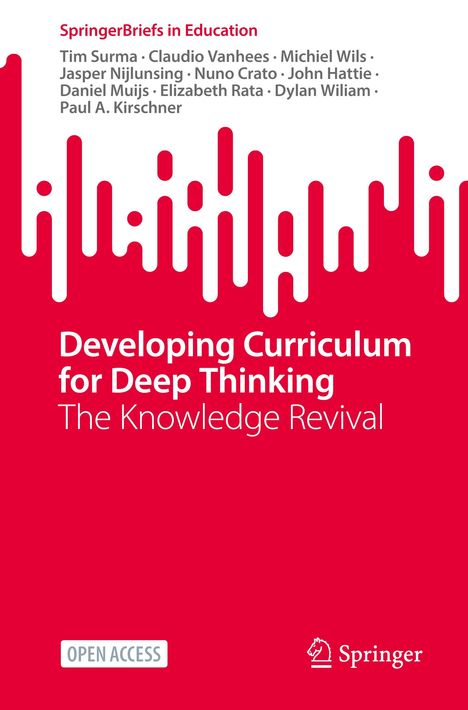Tim Surma: Developing Curriculum for Deep Thinking, Kartoniert / Broschiert
Developing Curriculum for Deep Thinking
- The Knowledge Revival
(soweit verfügbar beim Lieferanten)
- Verlag:
- Springer, 01/2025
- Einband:
- Kartoniert / Broschiert
- Sprache:
- Englisch
- ISBN-13:
- 9783031746604
- Artikelnummer:
- 12151360
- Umfang:
- 108 Seiten
- Gewicht:
- 178 g
- Maße:
- 235 x 155 mm
- Stärke:
- 7 mm
- Erscheinungstermin:
- 3.1.2025
- Hinweis
-
Achtung: Artikel ist nicht in deutscher Sprache!
Klappentext
This open access book discusses why the seemingly straightforward strategy of teaching children how to think deeply does not work and offers an alternative way forward for the curriculum to achieve these objectives. Over the years, the role of knowledge in the curriculum has, like a pendulum, shifted between two extremes, from highly visible to virtually invisible knowledge elements. Insights from cognitive and educational psychology, sociology, and curriculum studies are used to underpin the current knowledge revival that is widely being observed in education. A knowledge-rich curriculum is proposed by the authors as not only the soundest way forward to both effectively acquire knowledge and complex cognitive skills in school, but also as a crucial lever to achieve equitable opportunities for all students. In understanding how a knowledge-rich curriculum can enhance learning, three overarching principles are discussed: (1) content-richness, (2) coherence, and (3) clarity. These principles are illustrated through practical examples from schools and educators who have effectively integrated knowledge-rich curricula.
Biografie (John Hattie)
John Hattie ist Professor für Erziehungswissenschaften und Direktor des Melbourne Education Research Institute an der University of Melbourne, Australien.§Wolfgang Beywl ist Professor für Bildungsmanagement sowie Schul- und Personalentwicklung an der Pädagogischen Hochschule FHNW in Brugg-Windisch, Schweiz, und wissenschaftlicher Leiter des Evaluationsinstituts Univation, Köln.§Klaus Zierer ist Professor und Lehrstuhlinhaber für Erziehungswissenschaften an der Carl von Ossietzky Universität Oldenburg, Deutschland, und Associate Research Fellow am ESRC Centre on Skills, Knowledge and Organisational Performance (SKOPE) der University of Oxford, England.

